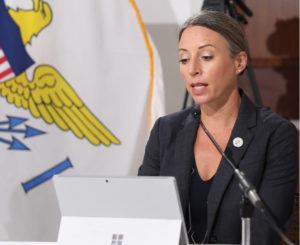
On Friday, March 13, one year ago, the V.I. Health Department announced that COVID-19 had reached the territory.
A news release issued at 8:15 p.m. detailed the first case of the virus in a “resident with some recent international travel history to one of the five locations with widespread transmission of the disease.”
As the USVI went into a government-mandated lockdown, along with most of the rest of the world, few could have imagined how completely life would change or for how long.
“You probably know exactly where you were at when you found out we had our first case of COVID,” said Territorial Epidemiologist Dr. Esther Ellis, in an interview reflecting on the anniversary. “I can picture myself exactly where I was at when we got that first lab confirmation, knowing that it was going to come because we started testing people in January. But when you actually got that first confirmed case, and it’s, ‘OK, it’s definitely here now,’ and everything that we’d been planning for was put into action, was definitely something that I will remember forever.”
Given its history of coping with disasters, the most recent example being the twin Category 5 hurricanes of September 2017, the territory was well-positioned to cope with the pandemic, Ellis said.
The USVI’s first case coincided with a COVID-19 emergency declaration by then-President Donald Trump as well as by Gov. Albert Bryan Jr., which activated the Emergency Operations Center with VITEMA in command. Soon after, territorial residents began receiving daily virus updates via instant messaging and emails, much as they would in a hurricane or an earthquake.
“As a community, we’re really good at listening and taking the guidance and making change. It almost feels like in a response to a disaster – you listen to the guidance that’s coming out and you do what needs to be done to protect yourself and your family and your community,” said Ellis. “A lot of the ways we’ve responded to hurricanes over the years, we’ve responded to COVID. The way that we helped our neighbors and helped our community with those that needed assistance, it really kind of mirrored how we respond to other disasters.”
That preparation and the willingness of the community to comply with mandates such as masking and social distancing, has put the U.S. Virgin Islands at the forefront of containing the virus, with just 25 deaths territorywide to date, Ellis said.
“One of the things I want to highlight is that we actually have the lowest overall death rate, if you compare all the states and territories, with the exception of the Northern Mariana Islands – that’s the only one that has a lower death rate than us,” said Ellis. (According to the World Health Organization, the commonwealth’s death toll stands at 2.)
Early on, however, that outcome was far from guaranteed.
“Our biggest challenge was just all of the unknowns and that it was a new virus we were constantly learning more about,” Ellis said. “When you’re disseminating information to the community you want to be right and we were right, but the information was always changing. … Making sure that the community understood that it was changing because we were learning more, and not because what we shared prior wasn’t correct, it’s just that’s what we knew at that moment,” was an ever-present challenge, she said.
The lowest point for Ellis came as her worst fears about the virus were confirmed, she said.
“Early on, when we didn’t know if asymptomatic people could spread the virus or not, and we learned that they could, from an epidemiology perspective, that is incredibly hard to control at that point,” Ellis said. “If you have people that aren’t sick at all, that can pass the virus to others, and those individuals can either become sick or also be asymptomatic, I think is your worst nightmare from a control standpoint, because you can’t just say, if you are sick, stay home. It’s now, anybody could be carrying it and not know and pass it to your elderly relative or a family member who is immune-compromised. I think that was a hard point for me.”
Conversely, the arrival of a vaccine just 10 months into the pandemic brought the greatest hope for the doctor.
“I definitely shed some happy tears that first day back in December when individuals were getting their first shot in the Virgin Islands of the vaccine, the Pfizer and the Moderna vaccines, and we’ll have the Johnson & Johnson one here very soon. We just put our order in,” Ellis said, referring to the most recent vaccine to come on the market, one that confers protection in a single dose versus the others, which require booster shots three weeks to a month later.
Today, the territory is among just a few locations in the country to have opened vaccinations to all age groups, 16 years and older, with free community clinics at the University of the Virgin Islands campuses on St. Thomas and St. Croix. According to a report by Forbes, Alaska is the only state to have similarly dropped eligibility requirements. In his speech on Thursday marking the anniversary of the pandemic, President Joe Biden called on all states, tribes and territories to follow suit and open the vaccine to all over 16 by May 1.
Booking an appointment at one of the territory’s clinics just became easier, too, with the rollout of online registration. Those without online access can call 340-777-8227.
“I think we stand in a really good place,” Ellis said, with 18,155 first doses and 8,337 second doses of the vaccine administered as of Tuesday, for a total of 26,492 total doses so far, she said.
“We are on track to hit the governor’s requirement to have 50,000 vaccinated, at least their first doses, by July 1,” said Ellis.


